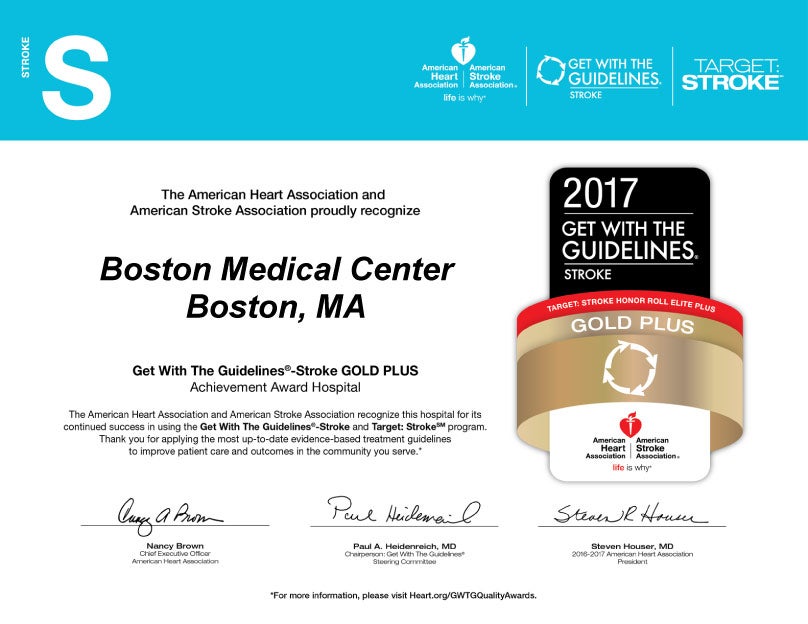
Boston Medical Center Stroke Service Was Awarded
SCORE Defect-Free Care
March 1, 2011
The Boston Medical Center Stroke Service was awarded received the SCORE Defect-Free Care > 70% award for stroke care. SCORE is stroke registry and quality improvement initiative implemented as partnership among the Massachusetts Department of Public Health, U.S. Centers for Disease Control an Prevention (CDC) Paul Coverdell National Acute Stroke Registry, and the American Heart/ Stroke Association's Get ith the Guidelines Stroke program. Boston Medical Center was one of 58 institutions participating statewide and has been involved in SCORE since 2005.
SCORE awards were developed in 2009 to recognize participating hospitals for their achievements in improving the quality of stroke care. The defect-free care measure demonstrates the percent of patients receiving all of the interventions for which they were eligible. There are 10 stroke consensus measures (see table below). Partial credit is not given as it is an “all or nothing” measure. For example, if a patient received eight of the ten interventions for which they were eligible, that patient would be included in the denominator but not in the numerator and would be counted as a “miss”. Data from 10/1/09 – 9/30/10 were analyzed for this award. For this time period the defect-free care rate was 77.5% (320/413 patients) at Boston Medical Center. The award will be presented at the Award Ceremony at the SCORE Learning Session on April 13, 2011 at the Doubletree Hotel in Westborough from 9:00 AM-10:00 AM.
Ten Stroke Consensus Measures
DVT prophylaxis
Percent of patients with an ischemic stroke, or hemorrhagic stroke, or stroke not otherwise specified and who are non-ambulatory who receive DVT prophylaxis by the end of hospital day two.
Discharged on Antithrombotic Therapy
Percent of patients with an ischemic stroke or TIA prescribed antithrombotic therapy at discharge.
Patients with atrial fibrillation receiving anticoagulation therapy
Percent of patients with ischemic stroke or TIA with atrial fibrillation/ atrial flutter discharged on anticoagulation therapy.
Thrombolytic therapy administered
Percent of patients with an acute ischemic stroke who arrive at the hospital within 120 minute (2 hours) of time last known well and for whom IV t-PA was initiated at this hospital within 180 minutes (3 hours) of time last known well.
Antithrombotic therapy by end of hospital day 2
Percent of patients with an ischemic stroke or TIA who receive antithrombotic therapy by the end of hospital day 2.
Discharged on statin medication
Percent of patients with an ischemic stroke or TIA with LDL 100 or LDL not measured, or on cholesterol-reducer prior to admission, who are discharged on a statin medication.
Dysphagia screen
Percent of patients with an ischemic or hemorrhagic stroke who undergo screening for dysphagia with an evidence-based bedside testing protocol approved by the hospital before being given any food, fluids, or medication by mouth.
Stroke education
Percent of patients with an ischemic or hemorrhagic stroke or TIA or their caregivers who were given education and/or educational materials during the hospital stay addressing ALL of th following: personal risk factors for stroke, warning signs for stroke, activation of emergency medical system, need for follow-up after discharged, and medications prescribed.
Smoking cessation / advice / counseling
Percent of patients with an ischemic or hemorrhagic stroke or TIA, given smoking cessation advise or counseling during hospital stay.
Assessed for rehabilitation
Percent of patients with an ischemic or hemorrhagic stroke or TIA who were assessed for rehabilitation services.
 ht
ht 
 English
English Français
Français Deutsch
Deutsch Italiano
Italiano Español
Español Tiếng Việt
Tiếng Việt